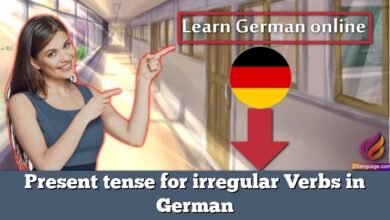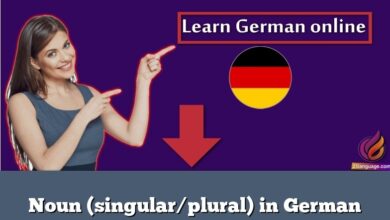Modal Verbs in German

Modal Verbs in German are special verbs that modify the meaning of other verbs. They express abilities, possibilities, permissions, or obligations. Here are the primary modal verbs in German along with their English translations:
- können – to be able to/can
- Example: Ich kann Deutsch sprechen. (I can speak German.)
- müssen – must/have to
- Example: Er muss jetzt gehen. (He must go now.)
- sollen – should/ought to
- Example: Sie soll früher kommen. (She should come earlier.)
- wollen – to want to
- Example: Wir wollen ins Kino gehen. (We want to go to the cinema.)
- mögen – to like
- Example: Ich mag Schokolade. (I like chocolate.)
- Note: mögen is also used to express a wish or preference, particularly in the subjunctive form.
- dürfen – to be allowed to/may
- Example: Darf ich das Fenster öffnen? (May I open the window?)
These modal verbs are essential for conveying nuanced meanings in German and are frequently used in everyday communication.
Examples
Absolutely! Here’s a table with examples of sentences using modal verbs in German, along with their English translations:
| Modal Verb | German Example Sentence | English Translation |
|---|---|---|
| können (can/be able to) | Ich kann Klavier spielen. | I can play the piano. |
| müssen (must/have to) | Du musst jetzt schlafen gehen. | You must go to sleep now. |
| sollen (should/ought to) | Wir sollen früher ankommen. | We should arrive earlier. |
| wollen (want to) | Sie will ein Buch lesen. | She wants to read a book. |
| mögen (like) | Er mag keine Milch. | He does not like milk. |
| dürfen (may/be allowed to) | Darf ich hier parken? | May I park here? |
Each sentence in this table demonstrates the use of a different modal verb in German, showing how they modify the meaning of the main verb in the sentence. Modal verbs are a crucial part of German grammar, offering a way to express various nuances such as ability, obligation, desire, and permission.
Sentences
Certainly! Below is a table with sentences that incorporate modal verbs in German, each followed by its English translation:
| Modal Verb | German Sentence | English Translation |
|---|---|---|
| können (can/be able to) | Ich kann schwimmen. | I can swim. |
| müssen (must/have to) | Du musst deine Hausaufgaben machen. | You must do your homework. |
| sollen (should/ought to) | Sie soll zum Arzt gehen. | She should go to the doctor. |
| wollen (want to) | Wir wollen heute ins Kino gehen. | We want to go to the cinema today. |
| mögen (like) | Er mag sehr gern Pizza. | He likes pizza very much. |
| dürfen (may/be allowed to) | Darf ich das Fenster öffnen? | May I open the window? |
These sentences provide examples of how German modal verbs are used in context, illustrating their essential role in expressing ability, necessity, permission, and preference.
Phrases
Sure! Here’s a table featuring phrases that use modal verbs in German, along with their English translations:
| Modal Verb | German Phrase | English Translation |
|---|---|---|
| können (can/be able to) | Wir können morgen früh anfangen. | We can start early tomorrow. |
| müssen (must/have to) | Du musst mehr Wasser trinken. | You must drink more water. |
| sollen (should/ought to) | Sie sollten sich ausruhen. | You should rest. |
| wollen (want to) | Ich will ein neues Auto kaufen. | I want to buy a new car. |
| mögen (like) | Er mag gerne Schokolade. | He likes chocolate. |
| dürfen (may/be allowed to) | Darf ich hier rauchen? | May I smoke here? |
These phrases show how modal verbs are used in various contexts in German, expressing different degrees of necessity, ability, desire, and permission. Modal verbs are integral to conveying specific nuances in the language.
Comprison
Certainly! Here’s a table that compares modal verbs and regular verbs in German, with their English translations. This comparison will help illustrate how modal verbs modify the meaning of regular verbs:
| Verb Type | German Example | English Translation | Comparison/Explanation |
|---|---|---|---|
| Regular Verb | Ich gehe zum Markt. | I go to the market. | Regular verb “gehen” (to go) indicates the action itself. |
| Modal Verb + Regular Verb | Ich kann zum Markt gehen. | I can go to the market. | Modal verb “können” (can) adds the ability to perform the action. |
| Verb Type | German Example | English Translation | Comparison/Explanation |
|---|---|---|---|
| Regular Verb | Sie liest ein Buch. | She reads a book. | Regular verb “lesen” (to read) shows the action. |
| Modal Verb + Regular Verb | Sie will ein Buch lesen. | She wants to read a book. | Modal verb “wollen” (want) expresses the desire to perform the action. |
| Verb Type | German Example | English Translation | Comparison/Explanation |
|---|---|---|---|
| Regular Verb | Er schreibt einen Brief. | He writes a letter. | Regular verb “schreiben” (to write) describes the action. |
| Modal Verb + Regular Verb | Er muss einen Brief schreiben. | He must write a letter. | Modal verb “müssen” (must) implies an obligation to perform the action. |
| Verb Type | German Example | English Translation | Comparison/Explanation |
|---|---|---|---|
| Regular Verb | Wir spielen Fußball. | We play soccer. | Regular verb “spielen” (to play) indicates the action. |
| Modal Verb + Regular Verb | Wir dürfen Fußball spielen. | We are allowed to play soccer. | Modal verb “dürfen” (may) adds the element of permission. |
This comparison highlights the distinct roles of modal verbs in altering the context or meaning of regular verbs in German sentences. Modal verbs express ability, necessity, desire, or permission, adding layers of meaning beyond the basic action indicated by the regular verb.





























